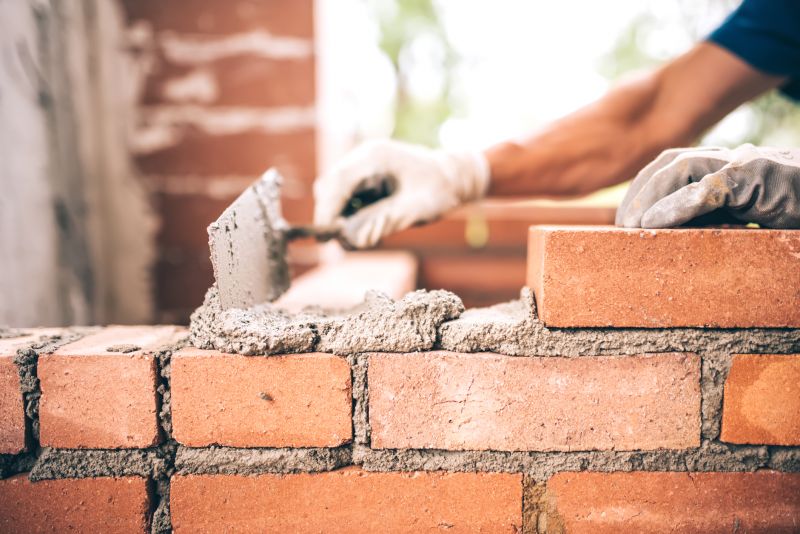Leading Products For Masonry Service Providers
Explore essential tools and equipment that enhance efficiency and quality in masonry projects for professionals.
 Masonry work in Albemarle, NC, requires a range of specialized products to ensure durability, precision, and safety. Whether undertaking a small repair or a large construction project, selecting the right tools and materials is essential for achieving quality results. Masonry products encompass a variety of items such as mortar, trowels, chisels, and sealants, each serving a specific purpose in the process of building or restoring stone, brick, or concrete structures. Having access to reliable and appropriate masonry products can significantly influence the efficiency and longevity of the work.
Masonry work in Albemarle, NC, requires a range of specialized products to ensure durability, precision, and safety. Whether undertaking a small repair or a large construction project, selecting the right tools and materials is essential for achieving quality results. Masonry products encompass a variety of items such as mortar, trowels, chisels, and sealants, each serving a specific purpose in the process of building or restoring stone, brick, or concrete structures. Having access to reliable and appropriate masonry products can significantly influence the efficiency and longevity of the work.
Top Overall Option
Multi-Purpose Masonry Trowel Set
A versatile set of masonry trowels designed to handle various tasks such as spreading, shaping, and smoothing mortar and concrete. Made from durable materials, these trowels are essential for both professional masons and DIY enthusiasts seeking reliable tools for diverse masonry applications.
Types of Products For Masonry Service
Mortar Mixes
Pre-mixed or custom-blended mortar suitable for different masonry applications, including bricklaying and pointing.
Trowels
Various shapes and sizes of trowels used for spreading and shaping mortar and concrete.
Chisels and Hammers
Tools for cutting, shaping, and breaking bricks, stones, and concrete blocks.
Sealants and Waterproofing Products
Materials designed to protect masonry surfaces from moisture penetration and weather damage.
Masonry Saws
Power tools used for cutting bricks, stones, and concrete blocks with precision.
Leveling and Alignment Tools
Devices such as spirit levels and laser guides to ensure accurate alignment and leveling of masonry structures.
Wire Brushes and Cleaning Tools
Tools for surface preparation, cleaning, and finishing masonry surfaces.
Form Liners and Molds
Reusable molds used to create decorative or uniform masonry shapes and patterns.
Concrete Mixers
Equipment for mixing concrete and mortar on-site for various masonry projects.
Safety Gear
Protective equipment such as gloves, goggles, and masks to ensure safety during masonry work.
Popular Choices
Hand tools designed for lifting and positioning bricks efficiently.
Narrow trowels ideal for detailed mortar work and finishing joints.
A sturdy hammer used for breaking and shaping stones and bricks.
Tools for applying and smoothing grout between masonry units.
Materials used to accommodate movement and prevent cracking in masonry structures.
Tools for removing old mortar during repair or repointing projects.
Equipment used to eliminate air bubbles and ensure proper compaction of concrete.
Power tools with wire brushes for surface cleaning and finishing.
Metal mesh used to strengthen concrete and masonry elements.
Products applied to masonry surfaces to enhance water resistance.
Specialized blades for cutting masonry materials with power saws.
Tools for shaping and finishing mortar joints.
Pigments used to customize the color of mortar for aesthetic purposes.
Materials used to retain moisture and promote proper curing of concrete.
Equipment for safely lifting heavy masonry units.
Tools for measuring and verifying the levelness of masonry work.
Chemicals used to improve adhesion between old and new masonry surfaces.
Materials that fill expansion joints to accommodate movement.
In masonry service, the choice of products often depends on the scope of the project, the materials involved, and the desired aesthetic. For instance, different types of mortar are suited for various applications, from pointing to structural bonding. Proper tools like trowels and chisels facilitate precise application and shaping, while sealants and waterproofing products help protect structures from moisture and weather damage. It is also important to consider safety gear and accessories that ensure worker safety during masonry tasks.
The market offers a broad spectrum of masonry products, ranging from basic hand tools to advanced chemical compounds. Quality and compatibility are key factors to consider when selecting these products to avoid issues such as cracking, deterioration, or poor adhesion. Local suppliers in Albemarle, NC, often carry a comprehensive selection tailored to regional building codes and climate considerations, making it easier for professionals and DIY enthusiasts alike to find suitable options. Proper product selection not only improves the quality of the finished work but also contributes to the overall safety and efficiency of masonry projects.
Investing in the right masonry products can make a significant difference in project outcomes. Whether you are restoring historic brickwork or constructing new stone facades, using the appropriate materials and tools ensures the work is performed effectively and with lasting results. Always consider the specific requirements of your project and consult with local suppliers or professionals to determine the best products for your needs.
Key Buying Considerations
- Identify the specific masonry tasks to determine the appropriate product types.
- Consider the durability and material compatibility of tools and supplies.
- Evaluate the quality of construction materials to ensure they meet project requirements.
- Assess the ease of use and ergonomic design of hand tools for efficiency and safety.
- Check for safety features and protective gear to minimize risks during work.
- Determine the suitability of products for the local climate and environmental conditions.
- Review product reviews and ratings to gauge reliability and performance.
- Ensure compatibility of new products with existing equipment and materials.
- Consider the availability of replacement parts and accessories for long-term use.
- Evaluate cost-effectiveness without compromising quality and safety standards.
- Look for products that facilitate precise measurements and alignment.
- Select products with clear instructions and ease of maintenance.
- Prioritize products from reputable suppliers with good customer support.
- Check for compliance with local building codes and standards.
- Consider the scope of the project to select appropriately scaled tools and materials.
